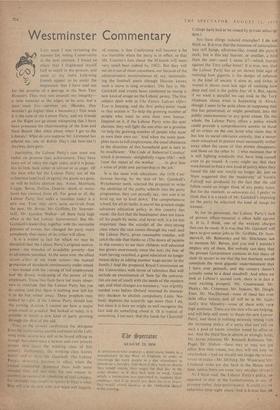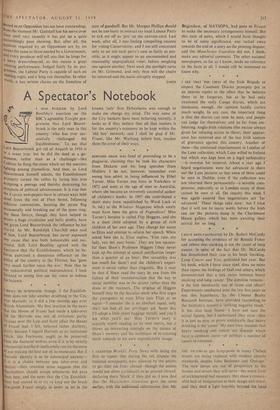Westminster Commentary
LAS-I week I was reviewing the reasons for voting Conservative at the next election. I found so many that I frightened myself half to death in the process, and some 6i my more Left-wing friends appear to be under the impression that I have sold out for the promise of a peerage in the New Year Honours. They may rest assured; my integrity— a little battered at the edges, to be sure, but a man must live--survives yet. (Besides, they wouldn't go higher than a baronetcy.) This week it is the turn of the Labour Party, and my friends on the Right can go about whispering that I have been promised the chairmanship of the Iron and Steel Board. (But what about when I get to the Liberals? What do you suppose Mr. Grimond has ()tiered me, one of Robin Day's old bow-ties?) Anyway, here goes.
Inevitably, the Labour Party's case must rest rather on promise than achievement. They have been out of ollice for eight years, and it is Ooint- less to look back either in sorrow or in anger. Of the men who led the Labour Party out of the wilderness (and back in again), the giants are gone, or will be before election day. Attlee. Morrison, Cripps, Bevin, Dalton, Deakin--death or retire- ment has claimed them all. For good or ill, the Labour Party that seeks a mandate today is a new one, True, they carry some survivals from the past; Mr. Bevan, Mr. Griffiths, Dr. Summer-
skill, Mr. Gordon Walker--all these held high office in the last Labour Government. But Mr. Gaitskell's leadership, together with the inevitable pressure of events, has changed the party more completely than many of its critics will allow.
It is a truism (a fact for which we may be thankful) that the Labour Party's original motive- power—the stimulus of avoidable poverty—has to all intents vanished. At the same time, the allied rahon deire of the trade unions—the mutual protection of standards continuously under attack —has waned with the coming of full employment and the drastic weakening of the power of the employers. 1 hese two facts have led many obser- vers to conclude that the Labour Party has _run its course, and that there is nothing now left for it to do but wither away. These prophets may indeed be r:ehi: if the Labour Party should lose the coming ekction, I cannot see how a major crisis coald oe avoided. But looked at today, it is possible to detect a new kind of party growing through the skin of the old.
True, at the annual conference the delegates from the coast tuency parties and some of the Left- wing trade +teams are still to be heard talking as though ;tar,ation were a serious and ever-present danger that face.' the working class of this country. Fortunately. the working class knows better and sd do ;es Mr. Gaitskell. The Labour Part y's ins ;triable practice in °nice, when the annual conference presented them with some demand they did not care. for one reason or another, to respond to (abolition of tied cottages, for example) was itntilv to ignore it. That is what they will also do next time (for what will happen, of course, is that Conference will become a lot less tractable when the party is in office, so that Mr. Cousins's fuss about the H-bomb will seem very small beer indeed by 1962). But they will not do it out of sheer cussedness, nor because of the administrative inconvenience of, say, nationalis- ing the football pools (though Heaven knows such a move is long overdue). The fact is, Mr. Gaitskell and events have combined to stamp a new kind of image on theLabour penny. The first subject dealt with in The Future Labour Offers You is housing, and the first policy-point made in that section is 'To help the growing number of people who want to own their own homes.' Depend on it, if the Labour Party wins the next election, they will fight the one after on a promise 'to help the growing number of people who want to own their own car.' And when the same pam- phlet turns to full employment, the usual obeisance in the direction of this household god is seen to he insufficient : 'The Code of Industrial Conduct' which it promises—delightfully vague title!—will 'raise the status of the worker . . . to give him a sense of pride and partnership in the job.'
It is the same with education; the 1958 Con- ference having, by the skin of Mr. Gaitskell's Wykehamist teeth, rejected the proposal to write the abolition of the public schools into the party progranime, they can proudly say, 'our aim is to level up, not to level down.' The comprehensive school, for all its faults, is one of the greatest single advances education policy in this country has made; the fact that the headmaster does not know all his pupils by name, and never will, is a lot less important than the scandal of the sixty-strong class where the rain conies through the root', and the Labour Party, given reasonable weather, will catch the tide that thinks so. (The desire of parents in this country to see their children well educated has grown enormously since the war; the fear of want having vanished, a good education no longer means delay in adding another wage-earner to the family.) And the proposed Royal Commission on the Universities, with terms of reference that will include an examination of 'how far the universi- ties are out of touch with the needs of the modern age, and what changes arc necessary.' was urgently needed even before Oxford reversed its momen- tary decision to abolish compulsory Latin. No- body deplores the scientific age more than I do, but since it is here we might as well recognise the fact and do something about it. (It is typical of something, I am•sure, that the funds for Churchill College have had to be raised by private subscrip- tion.) Are these things isolated examples? I do not think so, It is true that the nonsense of nationalisa-
tion still hangs, albatross-like, round the party's neck; but is this any heavier, or smellier, a bird than the one—need I name it?—which .bumps against the Tory collar-bone? It is true, too, that the Labour Party has as yet shown little sign of realising how gigantic is the danger of inflation in the kind of society it aims at, and (what is worse) it shows even less sign of realising how deep and real is the public fear of it. But, again, if we want a parallel we can look to the Tory blindness about what is happening in Africa, though I seem to be quite alone in supposing that this has penetrated, or might penetrate, into the public consciousness to any great extent. On the whole, the Labour Party offers a policy which could provide a comprehensive answer to those of its critics on the one hand who claim that it has lost its social releVance entirely, that a move- ment conceived in protest must necessarily wither away when the cause of that protest disappears; and those on the other ha J who maintain that it is still fighting windmills that have long ceased even to go round. A cynic might say that they were forced to find a new kind of policy when they found the old one would no longer do, just as
Shaw suggested that the 'modernity' of Verdi's Falstaff was produced by the fact that the old fellow could no longer think of any pretty tunes. But for the moment, as advoettius dei, I prefer to think that it is a result of Mr. Gaitskell's imposing on the party he inherited the kind of image he wanted.
As for its personnel, the Labour Party's lack of proven officer-material is often held against it. It is, i think, one of the weakest charges that-can be made. It is true that Mr. Gaitskell will have to give senior jobs to Mr. Griffiths, Dr. Sum- merskill, Mr. Bottomley and Mr. Mitchison, not to mention Mr. Bevan, and you and I wouldn't employ any of them. But nobody can deny that the present Government contains its fair share of duds (it occurs to me that the last fourteen words constitute the most gigantic understatement that I have ever penned), and the country doesn't actually come to a dead standstill. And when we
look at Labour's second rank, there is in fact a most exciting prospect. Mr. Greenwood. Mr.
Healey, Mr. Crossman, Mr. Jenkins, Mr. Dingle
Foot. Mr. Macptermot—none of these has ever held office before, and all will be in Mr. Gait- skell's first Ministry—some of them with very high positions. These are the men who are helping. and will help still more, to shape the new Labour Party, and there is nothing seriously wrong with the recruiting policy of a party that can call on such a pool of talent, whether tested by office or not. And the third line is almost as strongly held; Mr. James Johnson, Mr. Kenneth Robinson. Mr. Paget, Dr. Mahon—these may or may not yet office first time round, but they will not lone overlooked. (And we should not forget the trium- virate of exiles—Mr. Driberg, Mr. Wyatt and Mr.
Crosland—who are due back in the House next time, unless there are some very peculiar swiptns )
As I have said, the Labour Party's policy. as opposed to that of the Conservatives, is one of promise rather than performance. It could n he otherwise after eight years. And it is true that its
tteord as an Opposition has not been outstanding; from the moment Mr. Gaitskell lost his nerve over
• Suez until very recently it has put up a quite astonishingly poor showing. But, after all, the qualities required by an Opposition are by no means the same as those needed by a Government, and every producer will tell you that he longs for a lousy dress-rehearsal, as this means a great °Pening performance. Judged fairly by its pro- gramme, the Labour Party is capable of such an 1°Pening night, and a long run thereafter. In other Words, it has serious claims on the franchise of
men of goodwill. But Mr. Morgan Phillips should not be too hasty to instruct my local Labour Party to tick me off as 'pro' on the canvass-card. Last week, after all, 1 was finding compelling reasons for voting Conservative; and I am still concerned only to set out each party's case as fairly as pos- sible, as it might appear to an uncommitted and reasonably unprejudiced voter, before weighing one against another. Next week the spotlight turns on Mr. Grimond, and only then will the chairs be removed and the music abruptly stopped.
TAPER



































 Previous page
Previous page